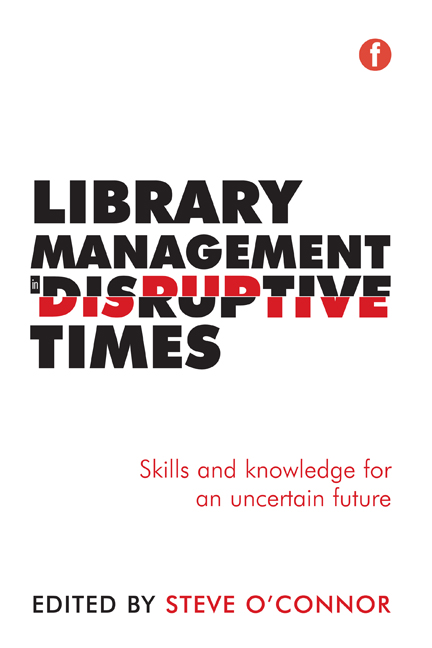Book contents
- Frontmatter
- Contents
- Contributors
- Introduction
- 1 Leading change: knowledge for success
- 2 Management fads and fashions and their impact on the LIS community
- 3 The Five Rules of Engagement for librarians: aux Ranganathan's laws of library science
- 4 Library management, disruption and consortia: an Australian example
- 5 No regrets; just lessons: economic crisis is changing our life and the management of libraries
- 6 Introducing agile principles and management to a library organization
- 7 The role of professional associations in changing times
- 8 And the walls came tumbling down ... The library profession confronts all-invasive new managerialism
- 9 What is behind the meaning of disruption? Or, thinking of management strategies from the outside
- Index
5 - No regrets; just lessons: economic crisis is changing our life and the management of libraries
Published online by Cambridge University Press: 08 June 2018
- Frontmatter
- Contents
- Contributors
- Introduction
- 1 Leading change: knowledge for success
- 2 Management fads and fashions and their impact on the LIS community
- 3 The Five Rules of Engagement for librarians: aux Ranganathan's laws of library science
- 4 Library management, disruption and consortia: an Australian example
- 5 No regrets; just lessons: economic crisis is changing our life and the management of libraries
- 6 Introducing agile principles and management to a library organization
- 7 The role of professional associations in changing times
- 8 And the walls came tumbling down ... The library profession confronts all-invasive new managerialism
- 9 What is behind the meaning of disruption? Or, thinking of management strategies from the outside
- Index
Summary
Introduction: library management and the global economic crisis
This chapter attempts to take a global, or at least a European, look at the effects of the economic crisis on the dominant, market-driven approaches to library management and at the underlying socio-economic aspects of that crisis. Throughout history, library administrators and managers have certainly demonstrated an active interest in socioeconomic and technological change and crisis. The risks and threats posed to libraries and library collections are typically related to natural causes (earthquakes, floods, etc.) and to human-related disasters (epidemics and wars, terrorism, etc.) resulting from political and social instability. Economic crises, however, have deep philosophical roots, are difficult to predict and even harder to understand (Greene and McMenemy, 2012). This is so in the case of the global economic crisis of 2008, which hit not only libraries but also their dominant underlying library management principles with full force. Indeed, although a number of studies are available (see Kostagiolas et al., 2013, for a review) on the effects of economic crisis on library services and their operations, very few, if any, actually deal with the impact of economic crisis on the library management paradigm itself. Lessons can be learned from the current economic crisis in terms of the role and the socioeconomic positioning of libraries, and obviously the ‘proper’ after-crisis library management still needs to be detailed, elaborated and analysed.
This chapter offers a contribution to discussions on the reassessment of the underlying values of library and information services management in the face of economic crisis. This management notion should aim to guide and actually prepare libraries to respond in financially straitened times. For the present analysis, it is not considered necessary to provide detailed definitions of economic (or fiscal) crises or even to detail the literature on the causes of the different types of crises. However, everyone dealing with library management will agree that a deep economic recession can bring about catastrophic socio-economic events that may cause shock to libraries. For example, public library administration will be in a distressed condition when state funding is reduced by 80% in three fiscal years and staffing levels are dramatically reduced.
- Type
- Chapter
- Information
- Library Management in Disruptive TimesSkills and knowledge for an uncertain future, pp. 65 - 84Publisher: FacetPrint publication year: 2015



